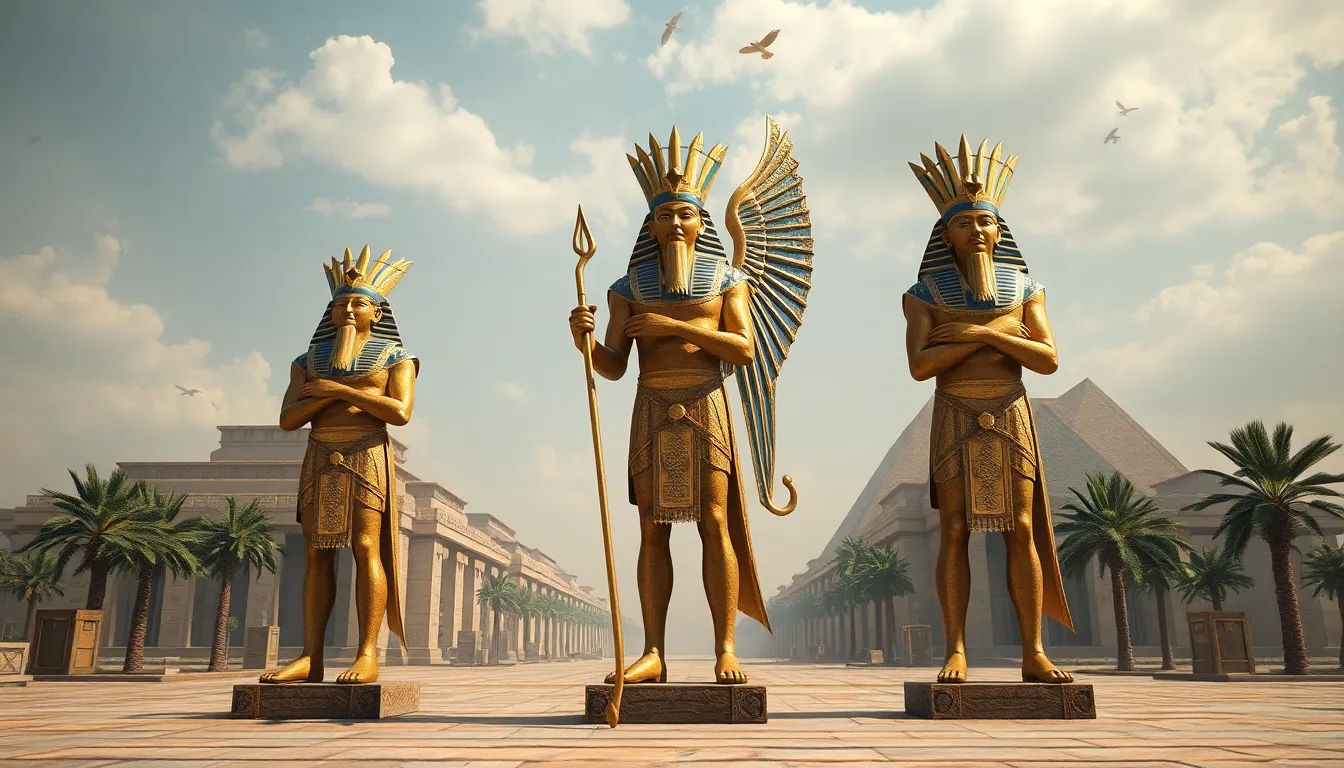The Divine Guardians of the City: Urban Deities in Ancient Egypt
I. Introduction
In the rich tapestry of ancient Egyptian culture, urban deities held a significant place, serving as divine protectors and patrons of cities. These deities were integral to the urban experience, embodying the values and aspirations of the communities they governed. Urban deities were not only symbols of protection and guidance but also represented the complexities of city life, which included governance, commerce, and cultural development.
This article explores the vital role of urban deities in ancient Egypt, emphasizing their historical context, major representatives, attributes, worship practices, and influence on governance.
II. Historical Context of Urban Deities in Ancient Egypt
The emergence of urban centers in ancient Egypt marked a significant shift in societal organization. With the growth of cities such as Thebes, Memphis, and Hermopolis, the need for divine guardians became apparent. Urban deities played a crucial role in the daily lives of Egyptians, reflecting the intertwining of religion and governance.
As cities developed, so did the roles and significance of urban deities. Initially, many deities were localized, but as urbanization progressed, certain gods gained prominence beyond their original locations, becoming central figures in the religious landscape of ancient Egypt.
III. Major Urban Deities and Their Cities
A. Amun-Ra: The Patron of Thebes
Thebes, the capital of ancient Egypt during the New Kingdom, was closely associated with Amun-Ra, the chief deity of the city. Amun-Ra emerged as a powerful figure, symbolizing both kingship and the divine right to rule.
- Historical significance of Thebes: As a political and religious center, Thebes was home to the grand Karnak Temple complex, where Amun-Ra was venerated.
- Amun-Ra’s influence on the city’s development: The deity’s favor was believed to ensure prosperity, leading to monumental architecture and cultural advancements.
B. Thoth: The Guardian of Hermopolis
Thoth, the god of wisdom, writing, and magic, was revered in Hermopolis, a city that became a center of intellectual and spiritual life in ancient Egypt.
- Thoth’s attributes and symbolism: Often depicted with the head of an ibis, Thoth represented the power of knowledge and communication.
- Hermopolis as a center of learning and wisdom: The city was known for its scribes and scholars, who contributed to the preservation and dissemination of knowledge.
C. Sekhmet: The Protector of Memphis
Memphis, an ancient capital and cultural hub, was under the protection of Sekhmet, the fierce lioness goddess associated with warfare and healing.
- Sekhmet’s role in warfare and protection: As a warrior goddess, she was invoked for protection in battles, embodying both destruction and healing.
- Memphis as a cultural and political hub: The city was a melting pot of cultural influences, with Sekhmet playing a crucial role in its identity.
IV. The Attributes and Symbolism of Urban Deities
Urban deities shared common themes that reflected the needs and aspirations of city dwellers:
- Protection: Many urban deities were seen as guardians against chaos and disorder.
- Wisdom: Deities like Thoth symbolized the pursuit of knowledge and enlightenment.
- Fertility: Urban deities were also associated with agricultural fertility, vital for sustaining urban populations.
In art and architecture, urban deities were represented through specific iconography, such as statues, murals, and temple inscriptions. Rituals and offerings, including food, incense, and symbolic items, were commonly performed to honor these deities and seek their favor.
V. Worship Practices and Community Involvement
Temples dedicated to urban deities were central to community life. These sacred spaces served not only as places of worship but also as centers for social interaction and cultural activities.
- Temples and sacred spaces: Each city had grand temples where rituals were performed daily, allowing citizens to connect with their deities.
- Festivals and public rituals: Annual festivals celebrated the gods, involving processions, music, and feasting, fostering communal spirit.
- The role of priests and priestesses: Religious leaders acted as intermediaries, conducting rituals and maintaining the temples, ensuring the deities’ continued favor.
VI. Urban Deities and Their Influence on Governance
The relationship between urban deities and political authority was deeply intertwined in ancient Egypt. Rulers often claimed divine lineage, presenting themselves as chosen by the gods to govern.
- Divine kingship: The belief that the pharaohs were divine incarnations reinforced their authority, making urban deities crucial in legitimizing their rule.
- Case studies: In cities like Thebes and Memphis, the close association between the ruling class and their urban deities shaped political dynamics and governance.
VII. The Decline of Urban Deities in Ancient Egyptian Religion
Several factors contributed to the decline of urban deities in the later periods of ancient Egyptian religion:
- Shifts in religious practices: The rise of universal gods, such as Ra and Osiris, began to overshadow local deities.
- The influence of foreign cultures: Conquests and interactions with other civilizations introduced new religious ideas, altering the traditional belief systems.
- The legacy: Although urban deities diminished in prominence, their influence persisted in later religious practices and cultural expressions.
VIII. Conclusion
The urban deities of ancient Egypt were pivotal in shaping the cultural and spiritual landscape of city life. They served not only as protectors and patrons but also as symbols of the ambitions and complexities of urban existence. The worship of these deities fostered community involvement and reinforced governance, illustrating the deep connection between religion and daily life in ancient Egyptian society. Their legacy continues to echo in the cultural memory of Egypt, reminding us of the profound impact that these divine guardians had on urban development and civilization.




